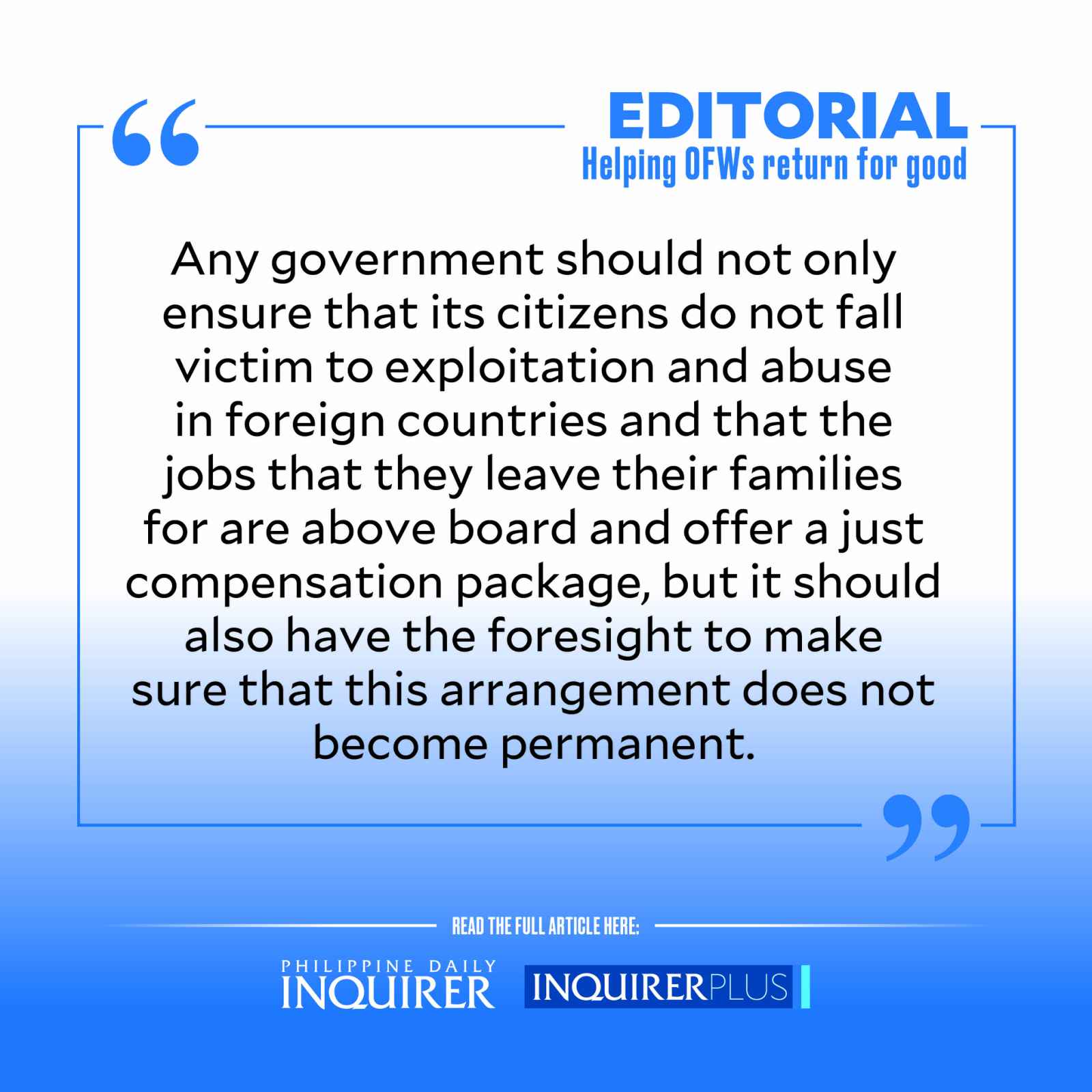[ad_1]

In the 1990s, singer Gary Valenciano released the song “Babalik Ka Rin,” dedicated to overseas Filipino workers (OFWs) who were scattered across the world and that no matter how far they were—from Saudi Arabia to Hong Kong, Europe or the United States—or how long they have been away, they will always find their way back. The song was not just a tribute to the thousands of OFWs who would leave the country each year to take on jobs as engineers, construction workers, nurses, caregivers, domestic helpers, etc. in developed countries, but also an attestation to the long-held belief that there’s no place like home.
Many OFWs, however, hesitate to come back for various reasons: lack of local opportunities, no savings, children are still in school. These were the same reasons cited in an OFW research study conducted by Philam Life in 2015 that showed eight of 10 OFWs were not yet ready to return permanently to the Philippines. Only 18 percent said they were ready to come home but only because they already had a business or enough savings.
There may be a solution for those who want to return yet are hesitating for those same reasons: the Department of Migrant Workers and the Department of Trade and Industry (DTI) recently signed an agreement aimed at strengthening the OFWs’ reintegration program by helping them start businesses that would make it easier for them to eventually return home without any worries about their financial future. The agreement covers assisting OFWs in the business registration process, including them and their families in DTI’s business training and development programs, offering financial literacy courses, featuring OFW products in trade fairs, and providing a network for OFW companies, products, or services to improve market access and promotions.
This is not the first time that the government has attempted to help OFWs reintegrate into the local economy. In 2011, then President Benigno Aquino III vowed to make migration for OFWs a choice rather than a necessity and committed to creating more local jobs to encourage workers to return. Per data from the Philippine Statistics Authority (PSA), however, the number of OFWs steadily increased from 2.04 million in 2010 to 2.44 million in 2015 before dropping to 2.24 million in 2016. At the height of the COVID-19 pandemic in 2020, it dropped to 1.77 million with more than 500,000 Filipinos repatriated at the time. A study published by the International Organization for Migration in May 2021 showed more than 80 percent of the repatriated OFWs could not find work three months after their return, exacerbated by the country’s already high unemployment rate due to the pandemic and lockdowns.
In 2021, PSA estimated that 1.83 million OFWs were deployed although a news report this year quoted a migration expert that the number has dipped below the one million mark. To be sure, the number of OFWs deployed has seen a marked decrease from the pre-pandemic 2.18 million, probably because workers’ contracts have not been renewed. But the fact that thousands of Filipinos still leave the country every year shows the continuing lack of local opportunities that could match offers from overseas.
Any government should not only ensure that its citizens do not fall victim to exploitation and abuse in foreign countries and that the jobs that they leave their families for are above board and offer a just compensation package, but it should also have the foresight to make sure that this arrangement does not become permanent. This may seem a lofty goal for a country that has become dependent on OFW remittances to boost economic growth, but the continuous deployment of OFWs reflects how the local economy is not robust enough to offer them stable employment. True, the demand for Filipino workers overseas is a testament that the world recognizes their skills and expertise, particularly as nurses and teachers. But, not to mention the social costs of exporting Filipino workers, wouldn’t it be more of a national pride to see them contributing to the country’s development and progress by applying those skills and expertise locally?
The next best thing for the government to do, if it cannot assure OFWs of stable employment back home, is to make sure that their hard-earned money will grow and that they don’t have to worry about their finances if and when they eventually choose to return. This is why it’s important for the government to step in and provide interventions on how OFWs can manage and grow their hard-earned money. There have been instances where they have lost money to scams or to failed business ventures because the OFW or the family back home were financially illiterate.
Helping OFWs reintegrate is in the right direction and should be sustained with the help of the private sector which has been offering financial literacy programs to ensure that the sacrifices of Filipinos working abroad will not go to waste. Now, if the Marcos administration can fulfill its promise to improve the economy to boost jobs, Filipinos will no longer need to leave and OFWs can finally come home—for good.
[ad_2]
Source link
